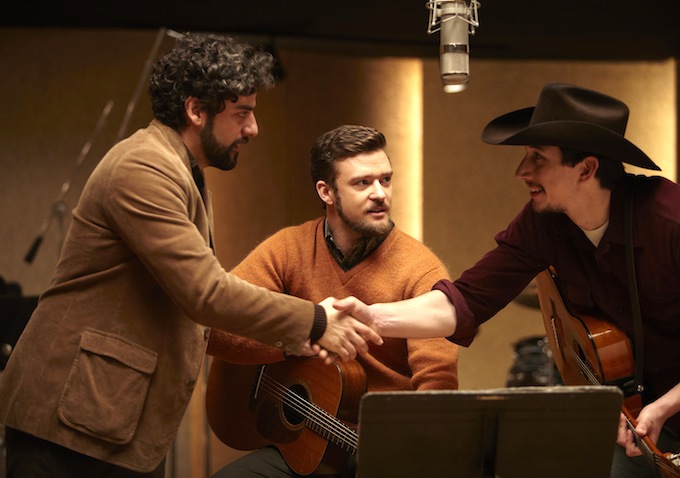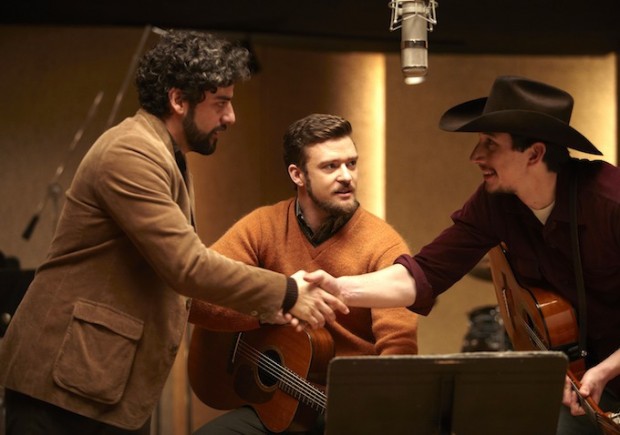
With this year’s Cannes Film Festival halfway done, one of the clear highlights is Coens‘ 1960’s-set folk music tale Inside Llewyn Davis. Profiling a down on his luck musician (Oscar Isaac), whose natural talent indicates he is destined for success, the film is a vivid portrait of what it means to be a starving artist. In our review, we said the film is “a bittersweet tale brimming with wit and humor and is sure to satisfy the appetite of hungry cinephiles and music fans alike.”
Following the premiere of the film, stars Oscar Isaac, Justin Timberlake, Carey Mulligan and Garrett Hedlund, as well as co-directors Joel & Ethan Coen and musician T-Bone Burnett all gathered for a press conference. From the genesis of the project to Bob Dylan’s influence to some potentially exciting developments closer to release, we’ve rounded up the five most notable bits of information revealed and you can read them below and on the next page.
Inside Llewyn Davis stemmed from a single image of the lead character in a low place and “there’s really no plot” in the film.
When it comes to the genesis of the film Ethan Coen says, “Several years ago we were just sitting in the office and Joel said, ‘suppose we start a movie with Dave Van Ronk getting beat up outside of Gerde’s Folk City,’ which was such an absurd picture.” He adds, “It took a few years to think about where it may go from there, why he might have been beaten up and what the story might be. That’s what the story grew out of. The idea attracted us because we were very much interested in the scene and what the village was in 1961, the whole sort of folk revival scene. We were always interested in the music and in every respect, what the scene was, what the village looked like back then — everything about it.”
His brother goes on to say, “The movie doesn’t really have a plot. That concerned us at a certain point, which is why we threw the cat in.” The duo admit the stressfulness of working with the animals, saying around half-a-dozen were used in filming. Joel says, “Dogs want to please you but cats only want to please themselves, so they aren’t easy to train or guide towards certain actions on screen so there were a lot of them. It was a bit of a pain in the ass, but it was alright.” As the lead, Oscar Isaac also has a great deal experience of these “pain in the ass” moments, one being when, “one of them freaked out at one point and did scratch me in the face, but that’s what happens when you tie a cat to you and run into the subway.”

Despite the comedy found in the film (and on set), Inside Llewyn Davis is not a parody of folk music.
As with many films from the Coens, their offbeat, deadpan humor runs throughout the film and it certainly transferred on set. Joel Coen says, “We do laugh a lot. In fact, we actually ruin sound takes.” While it didn’t bother cinematographer Bruno Delbonnel (who stepped in for the usual Roger Deakins, who was off “shooting James Bond for six or seven years,” the co-director jokingly says), the sound crew weren’t as pleased.
As his character continually hits roadbumps, Isaac adds, “The more in pain I would be, the more I would laugh. There is a lot of laughter and it’s interesting because it can be such a melancholic film but I know for me, in between takes I was smiling from ear to ear.” With all this laughter, however, the Coens approached the subject matter with seriousness.
Joel Coen says it was never intended to be a parody and that one “can tell from the movie that the music is something we have a genuine and deep fondness and respect for. Not to say there aren’t funny things about folk music. There are plenty of funny things about folk music.” Isaac backs him up, saying, “Also, it’s Llewyn’s perspective of a lot of those songs as well, which isn’t necessarily always correct. Just because he finds a song a little cheesy or not up to snuff doesn’t mean that’s the omniscient judgement of the song.”
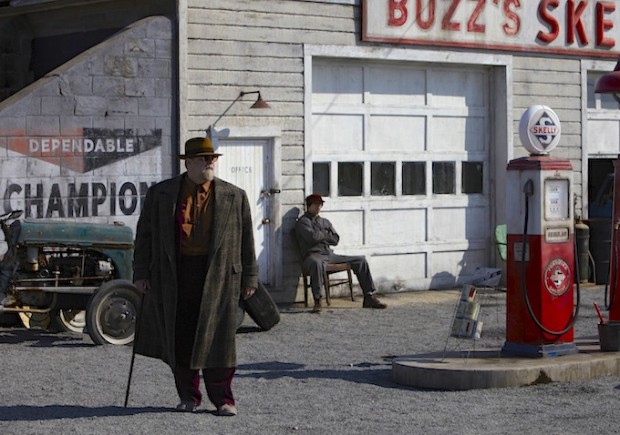
John Goodman introduced the Coens to the author of True Grit, who then influenced his own Davis role, one written specifically for him.
“We think about actors often when we write and sometimes we write specific parts for specific actors that usually we’ve worked before,” remarks Joel Coen. One such instance was John Goodman‘s character here, playing a jazzman taking Llewyn Davis on a trip to Chicago. Ethan Coen admits, “It’s a strange part of the movie, the roadtrip that’s kind of a break from the New York that we’ve established. The movie we’d done previously is True Grit written by a guy named Charles Portis, who does a lot of road stories and has a lot of old gasbags in a lot of his stories.” He goes on to say, “Goodman actually gave us the first Charles Portis novel that I read, which is called Masters of Atlantis, featuring one of his many gasbag characters.” Influenced by his work, Ethan Coen says, “We wrote this little road segment of the movie with a gasbag to compensate a partner who doesn’t say anything. Somehow it seemed like Goodman’s thing, an old jazz cat who can’t stop talking — the person you’d least want to be trapped in a car with traveling cross country.”
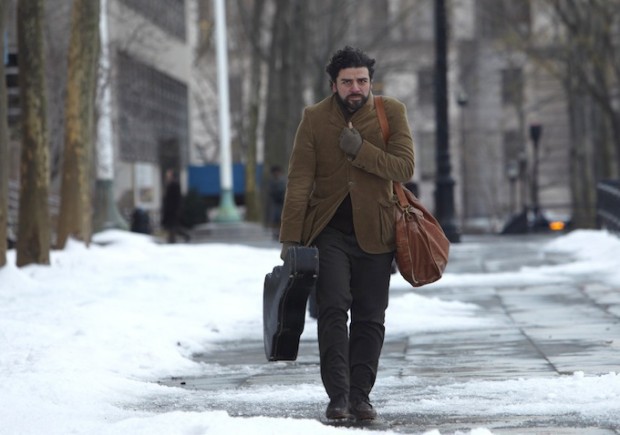
Bob Dylan was used as a counterpoint for the character of Llewyn Davis.
When one thinks about folk music the first person to come to mind is usually Bob Dylan, but although he’s not in the film, he was still used in the crafting of our lead character. Ethan Coen says, “I feel uncomfortable even talking about Bob Dylan in the context of this movie which is what you always get asked about because he’s the elephant in the room — the person whose not there. But Bob Dylan is like on Mount Rushmore now, you can’t even talk about him.” Joel Coen adds, “What was interesting to us was the lesser known scene, which is what Dylan came into as a opposed as to what Dylan, who was such a transformative character in both music and culture in general and how he changed that scene.”
Isaac chimes in, saying “We would use that as counterpoint in some ways and say, “This is not Bob Dylan. This is not the poet, the abstract, the thinker. This is the workman, the blue collar guy from Queens who knows who he is and isn’t trying to reinvent himself, for better or worse — mostly for worse.”
Justin Timberlake, whose character performs as a couple with Carey Mulligan, shared some insight on Davis and Dylan. “I had a very wise person in the music industry that said something to me that stuck with me which is, ‘if you can be the second guy to do the first thing, you will reap all the benefits from it.'” He adds, “So maybe Llewyn is just the first guy.”
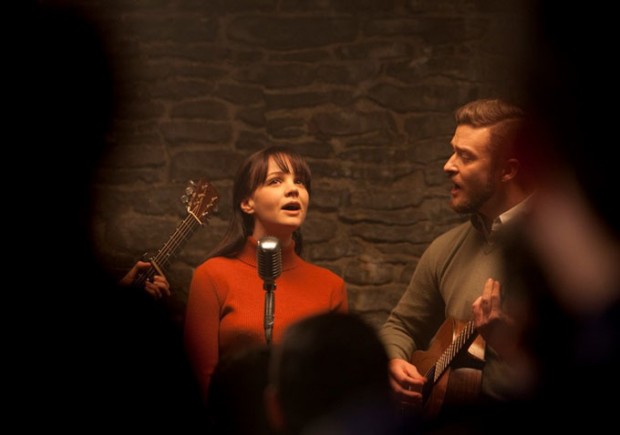
We may see in studio and live versions of the soundtrack, plus could there be a live tour?
After working together on O Brother, Where Art Thou? and The Ladykillers, the Coens once again reteamed with T-Bone Burnett to help them produce a varied selection of folk cover songs. As Joel Coen tells it, they gathered the film’s main players for a week before production began to decide what the music was going to be. He calls it a rehearsal for the music, but Isaac thought it was even more than that.
The star says, “It was a rehearsal for the characters in a way too. For all of us it was a real way to find out who these people were. Like I said, the songs were really what showed you their inner life and their taste and their point of view and I almost saw it as just as much a rehearsal for their ‘personhood’ as their music.” Gathering at T-Bone Burnett’s home, the music icon gave him a piece of advice, saying, “Sing it like you’re singing it to yourself.” Isaac says, “that stuck with me for so long, in not only playing the music, but being the actual character — like he’s always just singing to himself.”
Wrapping up the press conference, T-Bone says they actually recorded the entire soundtrack during these rehearsals in studio, as well as live on the set. He adds, “We have two different whole libraries of material to work with” and most notably says, “then also there be other events in the future.” Does this mean we could see two different soundtracks and a live event (perhaps a small tour?) T-Bone closes by saying, “It’s a small film that we’re doing ourselves, so we’re going to be doing everything we can to keep it alive — keep it happening.” He was cut off before saying anything else, but it clearly seems the passion is there and with many months to go before a release, we’ll keep you updated if such events do occur.
Inside Llewyn Davis premiered at Cannes Film Festival and opens on December 6th.

